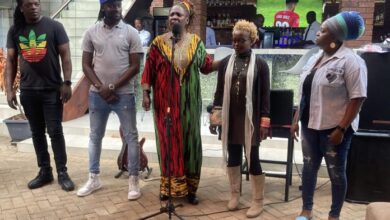Winky D’s “Not Like Us” Freestyle: A Subtle Diss on ‘Industry Plants’ and a Celebration of ZimDancehall’s Roots

ZimDancehall maestro Winky D made waves during his recent performance at the Castle Braai Fest with his freestyle titled “Tiki-Taka,” delivering a powerful message that subtly dissed ‘industry plants’ while celebrating the genre’s authentic roots. The performance, which took place over the weekend, showcased Winky D’s lyrical prowess and commitment to the integrity of ZimDancehall.
Freestyling over the beat of Kendrick Lamar’s “Not Like Us,” a track known for its critique of perceived cultural inauthenticity, Winky D drew parallels between his own experiences and Lamar’s challenges to mainstream music culture. His choice of beat was a strategic move, reinforcing his stance against those he perceives as undermining ZimDancehall’s authenticity.
In “Tiki-Taka,” Winky D emphasizes the genre’s origins, particularly highlighting Chitungwiza’s pivotal role in its development. His lyrics convey resilience and a refusal to conform to external pressures, as he boldly states, “Pane vakaita Chicken out, ndakaramba ndiri In(n) kumatcher Simbisa Brands.” This line encapsulates his steadfast dedication to ZimDancehall, despite facing doubt and resistance from some quarters.
The freestyle also addresses pressing issues within the ZimDancehall scene, particularly the challenges posed by drug abuse. Winky D expresses concern for fellow artists who have fallen victim to these struggles, lamenting, “Pamafira kureva paya ndaka reva, voti Rasta apa mapikisa Dance…” His words reflect a deep sense of responsibility as a leading figure in the genre, using his platform to advocate for positive change.
Additionally, Winky D pays tribute to the late Soul Jah Love, a key figure in ZimDancehall known for his authentic expression of the struggles faced by the community. His heartfelt tribute, “Rest in peace Soul Jah Luv, akafira Dance…” underscores the impact that Soul Jah Love had on the genre and its cultural significance.
Despite ZimDancehall’s popularity, the genre has faced criticism over the years, with some artists accused of promoting negative behaviors such as substance abuse and moral decline. In contrast, Winky D stands out as a champion of social justice, using his music to amplify the voices of the marginalized and to resonate with the socio-economic challenges faced by many.
Winky D’s performance at the Castle Braai Fest serves as a timely reminder of the importance of authenticity in music and the need to preserve the cultural roots of ZimDancehall. As the genre continues to evolve, artists like Winky D play a crucial role in ensuring that its message remains relevant and impactful, celebrating its heritage while addressing the pressing issues of the day.




